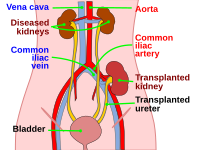
Photo from wikipedia
INTRODUCTION Post-transplant diabetes mellitus is a complication of kidney transplantation with deleterious effects on graft and patient survival and is associated with higher mortality. The goal of this paper is… Click to show full abstract
INTRODUCTION Post-transplant diabetes mellitus is a complication of kidney transplantation with deleterious effects on graft and patient survival and is associated with higher mortality. The goal of this paper is to identify risk factors that contribute to its development so that it can be avoided. METHODS We performed a retrospective analysis of 659 kidney transplants performed in adult patients between January 2013 and December 2017. We excluded patients with a previous diagnosis of diabetes mellitus and identified 61 patients with post-transplant diabetes mellitus (10.6%), then compared them to a control group of 61 patients who did not suffer from the disease, namely the kidney transplant pair or the patient submitted for transplant immediately after. DISCUSSION A comparative analysis of the 2 groups revealed significant differences regarding the use of β-blockers, fasting glucose on the fifth day post-transplant, kidney recipient age, and body mass index. Using multivariate logistic regression methods, 2 variables with an impact on post-transplant diabetes development were found: fasting glucose on the fifth day post-transplant (odds ratio 1.044, 95% confidence interval 1.010-1.079, P = .010) and body mass index (odds ratio 1.130, 95% confidence interval 1.009-1.264, P = .034). We did not find any differences for other potential risk factors. CONCLUSION A high plasma glucose level on the fifth day after the transplant and a high body mass index in the setting of the transplant can potentially impact the transplant's outcomes, so it is important to identify these levels as soon as possible to take measures to prevent this disease.
Journal Title: Transplantation proceedings
Year Published: 2019
Link to full text (if available)
Share on Social Media: Sign Up to like & get
recommendations!